Introduction
Mercosur (Southern Common Market) initially started with the Asuncion Treaty which was inked by Brazil, Argentina, Paraguay and Uruguay in 1991 to establish a free trade province and finally to establish a common market. In 2007, Venezuela joined the forum. (Tondi 353).
The main aim of Mercosur is to offer the probabilities to expand exports, to augment investment and to create a greater economic development among member nations. (Dominguez & Oliveira 178).
The core objective of Mercosur is to institute a customs union in common and a market place in common between member nations of Mercosur. (www.associatedcontents.com). Mercosur market includes free transportation of products and exclusion of custom duties among members within regions. (Motley 2006).
When there was an expansion in Mercosur in July 2006, the internal dynamics of Mercosur are being altered. Admission of Venezuela, which is the third major economy of Mercosur group after Brazil and Argentina which aggregates over 250 million population in the regional bloc and an aggregate of a GDP of $ 1.1 trillion.
To become a full member, Venezuela is required to implement Mercosur regulations and rules, which include espousal of CET and transpose Mercosur contracts with third nations into its domestic legislation. (UK House of Commons Report 80).
Venezuela’s government expenditure and its economy are depending upon its oil income. About thirty percent of Venezuela’s GDP comprises of oil income. Further, oil exports constitute about eighty percent of Venezuela’s export. About 16% of Venezuela’s GDP is made up from its service sector.
Though, t he economy of Venezuela is very robust, its entry into Mercosur will help to expand its economy. The main objective of associating with Mercosur is to expand its business within the region. (Motley 2006).
Venezuela became a full member of Mercosur in January 2006. However, Venezuela’s membership is not absolute as there is a midway phase to depart CAN and to synchronize strategies with other associate nations of Mercosur. (Massabie 153).
Though Venezuela approved the” Climate Change Convention in March 1995”, but it was the very last Latin American nation to approve in “February 2005 the Kyoto Protocol. “ For many years, Venezuela declined to approve the Kyoto’s Protocol in consonance with the OPEC as Kyoto Protocol did not acknowledge condition Venezuela as the major seller of oil. (Massabie 153).
Mercosur has been deteriorated frequently due to political chaos between its member nations. The admission of Venezuela to the Mercosur in the year 2008 brings a new member with a clearly varied political ideology into the Mercosur and has once again posed a threat to the political decision authority of Mercosur. (Tondl 28).
It is to be observed that Venezuela is playing an active role in all Latin American integration mechanisms. Venezuela was an associate of the “Andean Community of Nations (Comunidad Andina de Naciones, CAN)”. (O’Keefe 99). However, Venezuela said goodbye to CAN in 2005 averring grave divergence with other member nations. In 2004, Mercosur together with Colombia and Ecuador became an associated member of Mercosur.
The Protocol of Adhesion stipulates that it will be enforced once it is approved by all five signatory nations of Mercosur. The Venezuelan congress approved the Protocol of Adhesion as early as August 2006. As of January 2009, it is yet to be approved by the Paraguay and Brazil legislatures.
Once the Protocol of adhesion comes into effect, Venezuela will have about four-year time to espouse the full array of Mercosur norms, which includes CET also. Venezuela’s immediate integration into Mercosur is also hindered by the fact that Venezuela, though it has formally withdrawn from the Andean Community as early as 2006, it is still subject to the Andean intra-regional liberalization scheme until the year 2011. (O’Keefe 99).
The Southern Common Market (Mercosur) crossed nineteenth year of formation in 2010. In these nineteen years, the region transformed from a major restricted trade phenomenon to a free –trade province practically, with extra efforts in creating a customs union and moving on to a common market.
In spite of these developments, the assimilation process sustained impediments due to varied economic happenings such as Brazil’s currency devaluation, Asian financial crisis and later, the uncertainty of economy witnessed by Argentina. Thus, delays to the integration phases generate creditability concerns and could endanger the future of the Mercosur.
This research paper evaluates the present magnitude of economic assimilation of Mercosur, the tempo of the phases and the outcome of varied levels of economic integration.
It also evaluates the entry of Venezuela, the benefits, disadvantages, the roadblocks witnessed by it to become a full member, how Mercosur has benefited due to ingression of Venezuela and what are all the future challenges to be confronted both by Venezuela and Mercosur in detail.
Analysis
As a new member of Mercosur, Venezuela is in a transition phase from its earlier Andean Community Association. Venezuela’s integration into Mercosur is a phased one.
- By 2012, its tariff to Argentina and Brazil are to be removed with privileged access for main imports from Uruguay and Paraguay, which is to be offered instantly and free trade by 2013.
- Venezuela has to espouse the Mercosur common external tariff within four years.
- Some sectors like livestock, food, electronic equipment, software and automobiles are protected sectors.
- Venezuela is now required to implement Mercosur trade regulations and rules, which include the adoption of the region’s Common External Tariff and to swap Mercosur’s agreements with third nations into its domestic laws.
Definitely, Venezuela’s entry into Mercosur will transform the course of the region’s development. With Venezuela as a member in Mercosur, there is greater political risk is involved. Recently, another six year term of the presidency was won by President Hugo Chavez for a third term in Venezuela.
This has raised an alarm among business and industry that nationalization of various main industries in Venezuela is on the card. Out of 175 ranks, Venezuela has been ranked as 164 by World Bank for doing business. (UK House of Commons Report 65).
Significance of Venezuela’s Entry into Mercosur
Entry of Venezuela into the Mercosur free trade province under the Protocol of Adhesion brings more grand factors than included in ALDI ACE NO.59 which is the present free trade agreement which Venezuela is having with each other Mercosur nations.
For instance, under earlier ACE NO.59, many tariff curtailments are not anticipated to be wholly introduced till January 1, 2018 and there are even goods, which are excluded from free trade permanently.
On the contrary, both Brazil and Argentina, under the Protocol of Adhesion (POA), as a normal rule, will abolish tariffs on all imports from Venezuela from January 1 2010 whereas Uruguay and Paraguay will eliminate the tariff for all imports from Venezuela from January 1, 2013 and in turn, Venezuela will abolish all tariffs on all imports from Mercosur nations from January 1, 2012.
Immediately, after entry into the force of POA, Venezuela has consented to throw open up its market instantly to for a number of Paraguayan and Uruguayan imports. For so –called agricultural products, the protocol contains a provision that permits for a longer phase-out period ending January 1, 2014.
The Political Aspect of Venezuela’s Entry into Mercosur
The main aim of the Venezuela’s intention to join Mercosur as a full member is predominantly political.
Before joining Mercosur, Venezuela is not a poignant export market for the Mercosur nations. Both Argentina and Brazil, to some smaller magnitude, export some valuable manufactured products to Venezuela, mainly auto parts and also agricultural products and food items in a small quantity.
Incidentally, there are few exports to other Mercosur nations from Venezuela. Currently, oil is being imported by Brazil in large quantities from Venezuela and however, these imports by Brazil from Venezuela are of miniscule as compared to global petroleum exports by Venezuela. (O’keefe 100).
It serves medium and short-term economic interests to other Mercosur nations by the decision to admit Venezuela as a full member. The Argentines are much fascinated in collaborating with PDVSA, the Venezuelan state owned Petrol Company, which has offered investment capital to develop offshore natural gas and oil fields in Argentina.
Brazilian state owned petrol company namely Petrobras which evincing keen interest in joint ventures with its Venezuela’s equivalent to develop and explore oil wells, mainly to explore heavy oil in Venezuela’s Orinoco River Valley, which can be exported to northeastern Brazil.
Both Brazilian and Venezuelan oil companies have already invested about US$ 2.5 billion in heavy oil refinery in Pernambuco, which is in the North Eastern side of Brazil. The state petrol company of Uruguay also has a joint venture with PDVSA to establish heavy oil wells in the province of Orinoco and to establish an oil refinery in Uruguay, mainly to refine heavy crude.
Further, a natural gas pipeline is being constructed from Bolivia to Paraguay and Uruguay, which is funded by Venezuela. Further, Venezuela is having planned to construct a natural gas pipeline from Venezuela to the Southern Cone of Mercosur. (O’Keefe 100).
Mercosur –Venezuela Trade
In recent years, there has been a rapid increase of trade flow between Venezuela and Mercosur nations. It reached a record high of US$ 7.2 billion in 2007. This represents an increase of 25% increase of the figures of 2006 and an increase of 34% increase 2003 figures.
However, Venezuela’s exports to the Southern Cone bloc nations experienced a moderate increase of 10.8% between 2003 and 2007. It even shrank by 15.3% in 2007 aggregating to US$ 1.1 billion. Due to this, there was growth of US$4.9 billion in 2007 in trade balance in favor of Mercosur.
It is significant to note that the trade flows between Venezuela and Mercosur were much more balanced till the start of this decade and in some instances, exhibited a marginal increase in favor of Venezuela, as in 2000, when Venezuelan sales touched the magic figure of US$1.5 billion. (Instituto Para La 56).
There has been a substantial increase of exports by the four Mercosur nations to Venezuela, which stood at 60.5% in 2006 and was about 38% during the first six months of 2007. Thus, the four Mercosur nations accounted for 12% of Venezuela’s total imports.
The larger drive of sales to this destination as contrasted to shipments the other parts of the world, demonstrates that the Venezuelan market’s capability for the Mercosur products, especially manufactured products like pharmaceutical products, plastics , auto and automobile parts , food , cardboard and paper.
It is to be noted that Colombia was the nation which was badly affected due to Venezuela’s entry into Mercosur as it had earlier supplied of above mentioned products under preferential tariff stipulations to other Mercosur nations.
Further, Mercosur imports from Venezuela demonstrated strong increase during 2006, which stood at 146.1% but declined towards 9.9% during the first half of 2007. For all Mercosur nations except Uruguay, the significance as a supplier of the bloc is relatively limited.
Uruguay is the only country which soaks up almost fifty percent of the bloc’s imports from Venezuela. Moreover, in terms of energy, Venezuela has become a significant trading partner and its fuel symbolizes almost the whole of imports from the nations in Paraguay, Argentina and Uruguay and over sixty percent in Brazil.
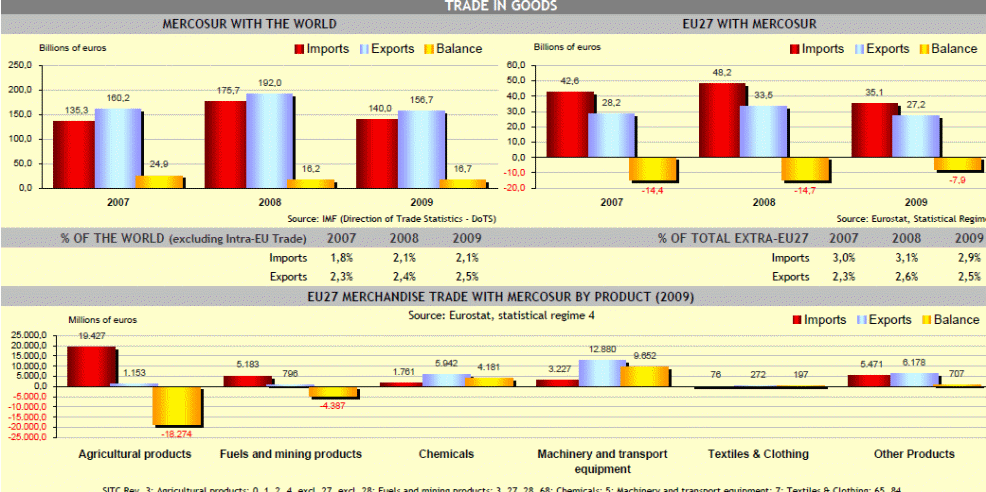
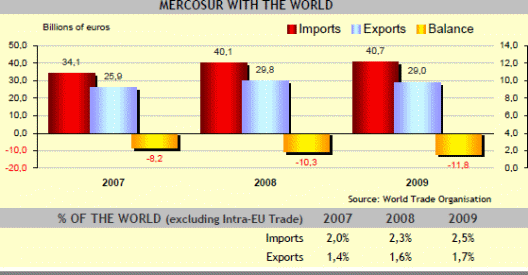
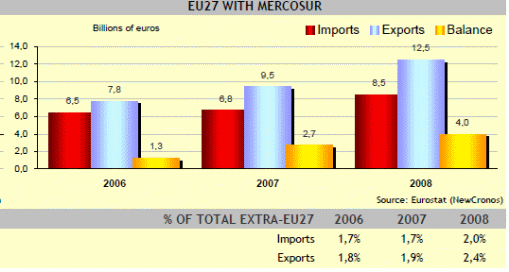
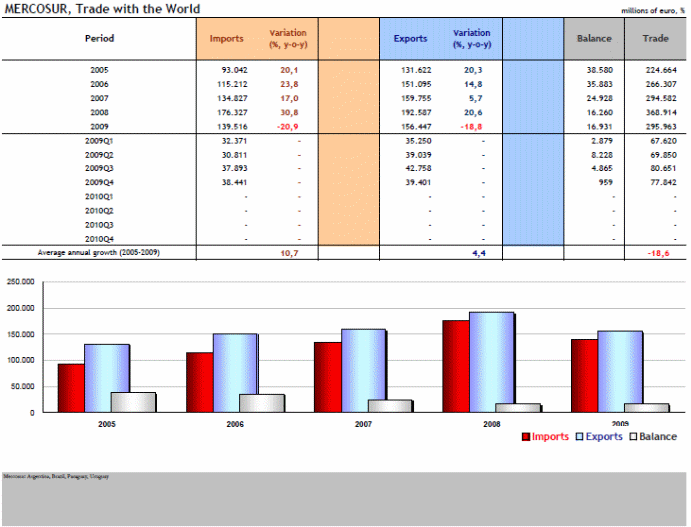
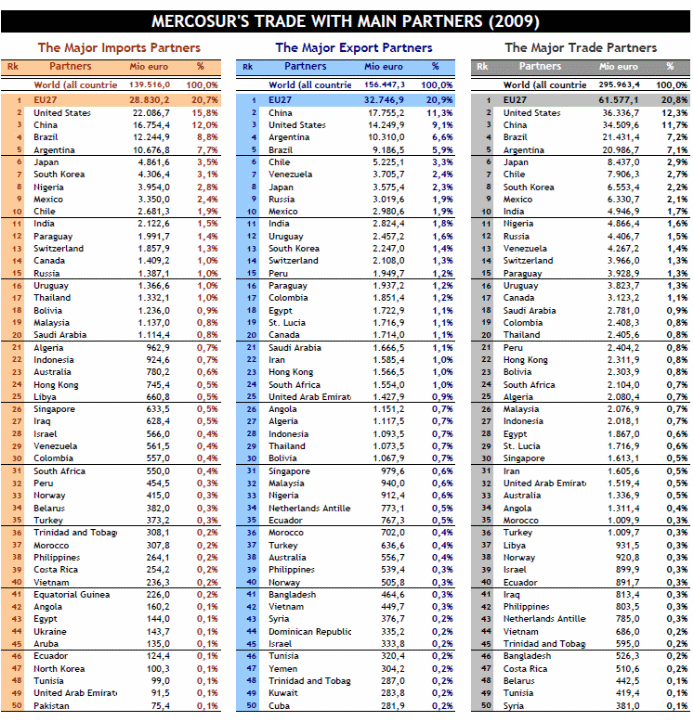

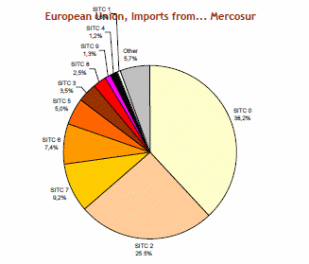
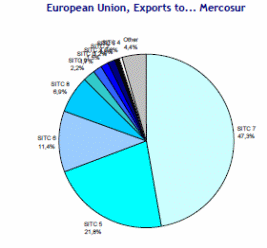
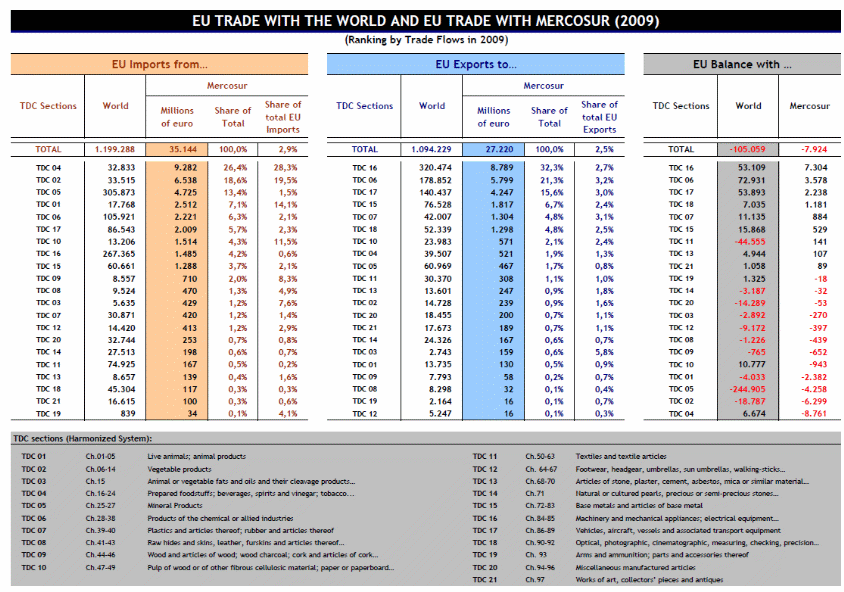
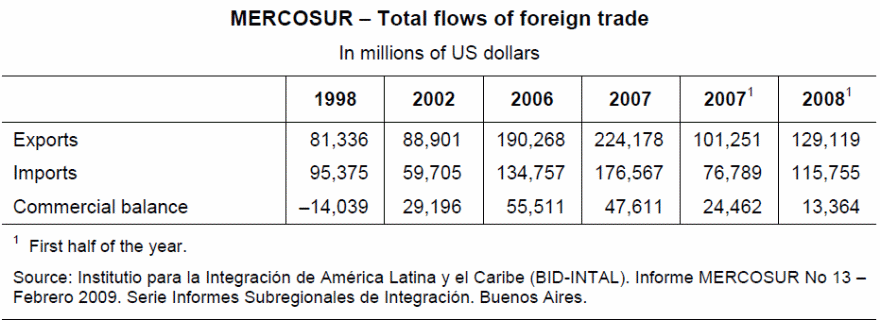
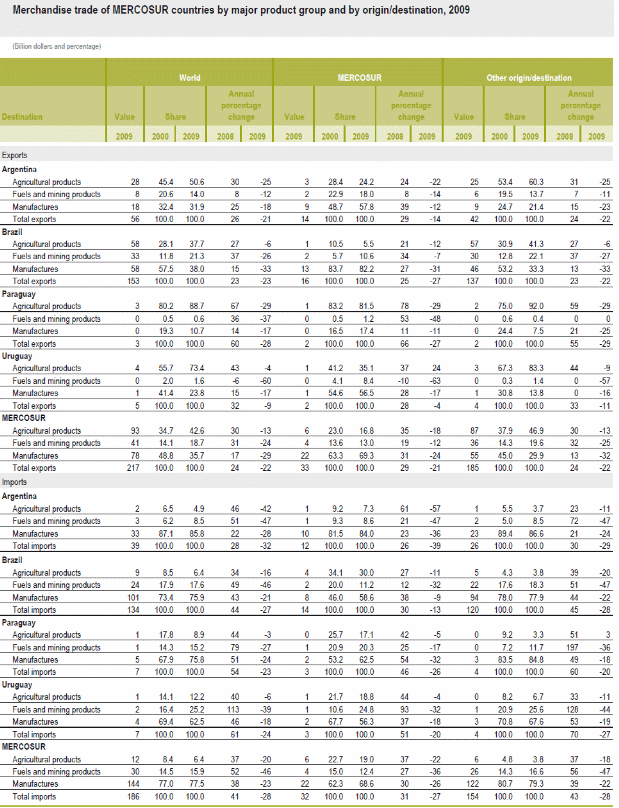
Venezuela’s financial and capital account behavior is closely linked to the significant current account balance of 15.1 % of GDP during the year 2003-2006. The flip aspect of this high surplus is a debit balance allocated between financial and capital account and the excess in the international reserves. The current account surplus of Venezuela is mainly attributed to the oil exports by the Venezuela’s government oil company namely PDVSA.
Venezuela’s government has the decision authority to decide what quantum of this surplus can be transformed into as official assets or international reserves and what quantum is to be earmarked for financial or real investment overseas. Venezuela witnessed a net outflow of capital since 1999 which in 2006 touched 12.4% of its GDP.
This balance symbolises both the surge in Venezuelan assets in foreign countries and the fall in the external liabilities. All Mercosur nations except Argentina witnessed accumulation in their international reserves during 2006 in line with the aim of minimizing external vulnerability in a context of escalating uncertainty at the international level.
Thus , Venezuela has reformed its policy towards the accumulation of reserves, which declined August 2007 to US$ 10b as against the US$37b maximum at the end of 2006 mainly because of its reallocation to the National Development Fund namely FONDEN. (Carciofi et al 3)
One another advantage of Venezuela in Mercosur is that it promotes investment by Venezuela in other member nations, and investment is also made by other member nations in Venezuela, Thus , this prolonged business cycle will assist to fortify nations within Mercosur.( Bassi 2006),
Venezuela will derive advantages from the introduction of total liberalization for the majority of products of interest to it in trade with other individual members of Mercosur. The greatest benefit will be in trade with the Brazil and Argentina as these nations have undertaken to introduce liberalization forward to 2010 onwards.
(Carciofi 111). Major advantages may be obtained from elimination of the exception to complete liberalization and of the price band system presently applied by Venezuela in its trade with Mercosur nations. (Carciofi 112).
According to Maduro, Venezuela’s foreign minister, there has been an enhanced commercial relations between Mercosur and Venezuela as trade has grown to $28 billion from the just $2 billion. Mercosur will also strive to achieve a common custom’s code to kindle and minimize the cost of commerce among Mercosur nations.
Further, there is an effort by Mercosur to remove double-taxation and associated transport holdups on imports that is being transported through one member nation to arrive at another Mercosur member nation.
It is estimated that by 2014, there will be complete elimination of double-taxation of imported merchandises and there will be a single Mercosur customs union, unifying terms so that duties on exports and imports can be arrived at and exchanged across Mercosur member nations.(IntelliBriefs 2010).
Disadvantages
From the above table, it is evident that the entry of Venezuela into Mercosur as a new full member has a moderate brunt on the region’s trade and economic profile.
Though Venezuela is having a higher per capital GDP as compared to the Mercosur’s mean, the value of Venezuela’s annual import is not very admirable. The chief part in cost-benefit analyses of Venezuela’s admission into Mercosur is the energy capabilities that the Venezuela adds to the region. (Carciofi 101).
There are fewer disadvantages for Venezuela’s accession to Mercosur. Member nations are of the view that many agreements and rules framed by Mercosur are of one sided. One another disadvantage is that Venezuela may face that it may be the victim of intellectual property privileges.
With more exports of electronic products from Venezuela into other Mercosur member nations may end in copying of ideas of Venezuela’s products thereby resulting in the emergence of grey markets for Venezuela’s electronic products. (Ledesma 2008).
Despite advancing the time frames which will usher advantages to Venezuela, it is significant to note that majority of selected goods already have momentous preference margins. The effect will be relatively modest even by advancing timeframe to enjoy the advantages in market access norms.
This symbolizes despite there are chances for trade expansion, membership of Venezuela in Mercosur does not symbolize momentous transformation in market access norms for those associated, given the present preference as the trade liberalization deadlines already discussed in ECA 59. (Carciofi 111).
External Agenda of Mercosur will be influenced by Venezuela’s Entry
One of the major anxieties ventilated by the business sector over Venezuela’s ingress into Mercosur is that it may wield its influence on the external agenda of the bloc. As per National Confederation of Industry, immediately after inking the Membership Protocol, Venezuela will attain the status of inclusion in the Mercosur delegation for negotiating with other nations and blocs.
Thus, without going through the transition period, Venezuela may have its articulation in such discussion as one of the framer of the Mercosur’s negotiating programs with the EU and U.S.A. (Carciofi 117).
Democratic Clause in Mercosur
Among the founding members of Mercosur, democracy was a common value and was visualized as a precondition for integration. It is to be noted that in the preamble either in the constituent treaty of Mercosur or the Treaty of Asuncion signed in 1991 contained democratic clause. The first ever mention about democratic setup is seen in the “Declaration of the Second Presidential Meeting of Mercosur” of June 1992.
Mercosur member nations in July 1996 reiterated the significance of democratic conditionality by sealing the “Declaration of the Democratic Agreement.” In July 1998, the Democratic agreement was officially instituted into the “Treaty of Asuncion “by means of the Protocol of Ushuaia.
This protocol specifically provides after a phase of consultation, the rights of a member state of Mercosur can be suspended where the democratic order is in chaos, mainly to deliberate in the institutions of Mercosur. (Hoffmann & Vleuten l 180).
It will be interesting to follow the effect of the democratic clause, given the polemic circumstances of the democratic credentials of Chavez’s government. It is to be noted that decision to include Paraguay in the Treaty of Asuncion was regarded in 1989 only after the end of the dictatorship. (Vaz 126).
It is to be noted that no stringent action was taken during the Venezuela crisis other than support expression for a return to a democratic rule by Mercosur nations. It is pertinent to note that Mercosur does not have an adequate explanation on how to handle corrosions of democratic ruling. (Morton, Halperin & Galic 109).
Chavez’s autocratic style and Paraguay’s Opposition
Though Venezuela’s request to admit as a full member of Mercosur was approved in June 2006 in Caracas by the leaders of Brazil, Argentina, Paraguay and Uruguay, the proposal has to be accepted by the legislatures of the concerned nation also. Both Uruguay and Argentina legislatures were the first to acknowledge the Venezuela’s incorporation as a full member.
Brazil’s Senate, after three long years of debate approved the Venezuela’s inclusion in Mercosur in December 2009.
Paraguay’s senate is yet to accord its approval since the Paraguay’s President Fernando Lugo does not enjoy the adequate support and his opponents have raised their voice against inclusion of Venezuela in Mercosur on the ground of “autocratic practices and style “ of President Chavez, which is in clear opposition to the main slogan of “ Mercosur Democratic Clause.”
According to Senator Romero Juca, a senator from Brazilian ruling coalition, Venezuela’s role is extremely significant for the economic and social development of South America and hence, Brazil would exert its utmost pressure on Paraguay on the necessity for acknowledgement of Venezuela’s admission as a full member in Mercosur. (Brazil Mag 2010).
Paraguayan opposition opposes the political style of the President Hugo Chavez and not the entry of state of Venezuela into Mercosur. They view Chavez as an undemocratic and they are of the opinion that his arrival may harm Mercosur. Some critics are of the view the Mercosur as a mirror of the European Union and lament that their entry of Chavez may injure the trade pact with EU.
It is to be observed that Venezuela major imports are foodstuff and Paraguay can benefit from exporting to Venezuela its oil seeds, grains and meats.(UPI.com 2010).
Whether Mercosur is a successful and what is its future?
Since its start-up, Mercosur has turned to be Latin America’s most elegant integration agreement.
However, both Argentina and Brazil were passing through a recession and there was a disagreement on which foreign exchange policy to be perused. This disagreement has become a real threat to the future of Mercosur. (Gillespie, Jeannet and Hennessey 46).
The initial success of Mercosur was demonstrated by the truth that international trade among the four nations soared to 200 percent in the 1990s. However, after 1999, trade and commerce were badly impacted due to Brazil’s currency devaluation and its consequent financial crisis and there was default of external debts by Argentina. The economy and trade were affected severely between 2000 and 2002 and especially in 2004.
In particular, Argentina flouted the Mercosur access conditions by introducing several protective measures and barriers to free trade. Due to non-coordination between members, the future of Mercosur is now uncertain. (John, Craig & Lynk 308).
Recent happenings do not seem good for the future of Mercosur. In the year 2006, a dispute between Uruguay and Argentina over whether to permit European companies to establish two paper mills along the river that separates their border was not resolved through Mercosur’s internal dispute resolution mechanism.
Further, Uruguay expanded its trade with the U.S.A and even cautioned that it may withdraw from Mercosur commenting that Mercosur is to serve the interest of Brazil and Argentina.
Moreover, Mercosur has not resolved trade asymmetries that have arisen within its members, yet to resolve the concern of double tariff on certain imports from outside the bloc, yet to codify a custom code that is common and this has led some analyst to view that Mercosur has turned to be a forum of foreign policy modeling.
These beliefs have only been corroborated by recent discussions between the European Union and Brazil regarding the possibility of a bilateral trade negotiation. (Seelke 8).
Why Paraguay Has Not Allowed Venezuela’s Entry To The Bloc? What Are/Would Be The Consequences It The Country Decides To Finally Admit Venezuela?
For Paraguay, in spite of economic advantages derived by Paraguay due to Venezuela’s entry into Mercosur as its full member, the aristocrat style of Hugo Chavez, the Venezuelan president elevates the cause of worry for Paraguay. The political style and personality of Chavez is just conflicting to Mendez, the present president of Paraguay who emphasizes moderation.
Paraguay is of the opinion that Mr. Chavez’s extreme patriotism will fetch more chaos to Mercosur. Paraguay is of the opinion that Venezuela’s confronts with Colombia will need of redrafting of its stance for Mercosur since Paraguay is of the view that Venezuela’s entry may bring a blockade in the negotiation for creating a trade relations between European Union and Mercosur nations.
The adversaries of Chavez’s program for a substitute style of integrating South American economies, which insists issues of social justices which are not restricted to his domestic foes. Both the big businesses from Venezuela and member nations of Mercosur especially Paraguay have a common grumble against Chavez may destabilize the Chavez’s effort of amalgamating the South American nations against Washington.
Already, Paraguay is entangled with the heightening brawls with Argentina and Brazil, as the national leaders of Paraguay are questioning the real advantage of awarding full membership to Venezuela.
Further, Paraguay is having a legitimate concern over equity treatment that travel back to very first day of formation of Mercosur. For instance, Brazil and Paraguay, which enjoy the gargantuan dam namely “ Itaipu Dam” which is being one of the globe’s biggest hydroelectric energy projects an d Paraguay has raised dispute over dominance of Brazil in the Itaipu project.
This has made the Paraguay politicians to allege that Paraguay’s association with the Mercosur is a disgrace since the Mercosur membership does not offer any meaningful advantages to Paraguay.
Paraguay is actively engaged in establishing a bilateral trade agreement with the U.S.A which has compelled Chavez to give up his nation’s economic tie-up with the other nations of South American trade group that have followed Paraguay’s FTA with U.S.A and could end in Mercosur fugitives to renounce full membership in the Mercosur.
Paraguay is of the view that Chavez main aim to join Mercosur is to shape his counterweight to U-S supported freed trade agreements thereby uttering that admission of Venezuela as indicator for integration of South American economies and a sign of triumph against U.S.A’s colonialist economic strategies for the region.
Thus, there is a need on the part of Chavez to stop this encouraging the exit of Paraguay which means fracturing of Mercosur internal unity which would symbolize a devastating philosophy rout in Chavez’s struggle to keep U.S.A’s authority isolated in the region.
If at all Venezuela wants to isolate U.S.A, it should come forward to offer lower tariffs for Paraguayan merchandises well before free-trade regions are concluded for the balance of Venezuela’s inter-Mercosur commerce for the period between 2012 and 2013.
This approach will help Venezuela to get the support of Paraguay by helping it to tackle Paraguay’s negative economic scenarios and it will also heighten small economies like Paraguay attitude towards Venezuela as Paraguay may have to weigh the real benefits from Venezuela’s participation in Mercosur.
According to erstwhile Paraguayan President Duarte Frutos that if real aim of the Mercosur is to criticize the protectionism of EU and U.S.A, they should practice the same protectionism among the small member nations of Mercosur and if this continue, then these small member nations like Paraguay may decide their concern would be served outside Mercosur.
Further, Chavez call to build a common army for Mercosur may kindle Chavez’s economic and political adversaries to join under one roof to retort his action for integration or may spoil hesitant allies to get back their support to Mercosur. (Coha 2010).
Paraguay is having strong political disparity but at the same time it is also of the view that Venezuela’s entry into Mercosur is more interesting to it economically. Paraguay opposition is vehemently against Chavez and not against Venezuela as his attitudes are not only undemocratic towards the press and opposition but also Chavez’s meddling in other nation’s domestic business for ever.
However, adequate pressure is exerted by Argentina and Brazil on Paraguay to shift its stance against Venezuela which can have considerable impact on landlocked Paraguay given its trade discrepancies and geographic location.
One another stumbling block is that approval of both houses of Paraguay’s congress is to be obtained before the bill for accrediting full membership for Venezuela which is to be inked by Paraguay’s president Lugo. However, since Lugo is lacking majority in any of the houses of congress and hence Logo is compelled to negotiate with the ruling coalition which itself is splintered. (MercoPress 2010).
Conclusion
It is obvious that membership of Mercosur has not paved the way for change in the replica of economic development. Nor have the assurances of enhanced trade opportunities, larger international profile and access to new markets. Rather than an increase in exports, Mercosur has witnessed a concentration of exports. Economic growth has been disappointing and flow of FDI is rather stagnated.
No doubt, Venezuela’s entry into Mercosur will definitely make aligning the bloc’s trade agendas more of a challenge. Venezuela’s foreign trade and productive structure are poignantly differing to the present member nations of Mercosur, and this will definitely have a say on its trade policy preferences.
There are two chief challenges to the future of Mercosur.The first one is the political and economic crisis. The chances of survival are not encouraging without a speedy recovery from the present global economic turmoil.
There are three structural deficiencies of the present concept of Mercosur, and they are the lack of macroeconomic coordination, the institutional weakness and the intra-industry trade strategy. (Weintraub, Rugman & Boyd 148).
The above mentioned deficiencies can be corrected.
- By fine tuning the relatively demanding theory of a “ Common Market” to the political realities by acknowledging the fact the readiness to share sovereignty and by substituting the greatly personal –decision making measures through a more rule oriented system and
- By keeping away from macroeconomic doctrines at the national level which intimidates to generate deformed real exchange rates within the region?
To rejuvenate and revitalize Mercosur, it is the need of the hour to reform its productive capabilities following comparative benefits. Mercosur’s structural weakness still remains to be resolved. If this disadvantage is considered seriously, it is obvious that the future of Mercosur must remain in doubt, even if the current economic turbulence can be conquered. (Weintraub, Rugman & Boyd 148).
Works Cited
Bassi, Raul. 2006. Venezuela in MERCOSUR. A New Mercosur. Web.
Brazil Mag. (2010). Brazil to Pressure Paraguay into Accepting Venezuela into Mercosur. Web.
Carciofi, et al. Mercosur. Report Number 12:2006 [Second Semester]. New York: BIDINTAL.
Coha , K. B. 2010. Venezuela’s First Meeting as Mercosur Member Begins Today. Web.
Dominguez Francisco & Oliveira Marco Aurelio Guedes de. Mercosur: Between Integration and Democracy.Brasilia: Peter Lang, 2006.
Gillespie, Jearnet & Hennessey. Global Marketing. London: Dreamtech Press, 2009.
Great Britain, Parliament: House of Commons. Trade with Brazil and Mercosur. London: TSO, 2007.
Hoffimann Andrea Ribeiro, Vleuten Johanna Maria Van Der. Closing or Widening the Gap? Legitimacy and Democracy in Regional. London: Ashgate Publications, 2007.
Instituto Para La Integracion de America Latina Y el Caribe, INTAL. Mercosur Report Number 13:2007, Second Semester -2008. New York: BIDINTAL, 2008.
John D., Craig R & Lynk Michael. Globalization and the Future of Labour Law. Cambridge: Cambridge University Press, 2006.
May. (2008). An Investment Under the Mercosur Trade Centre. Web.
Massabie German. Venezuela: A Petro-State Using Renewable Energies. New York: VS Verlag, 2008.
Merco Press. 2010. Paraguay Admits Pressure from Brazil to Vote for Venezuela’s Mercosur’s Incorporation. Web.
Morton H., Halperin and Galic Mima. Protecting Democracy: International Response. London: Lexington Books, 2005.
Motley, La’Sarah-evette Patrice. 6 January 2006. Mercosur –The Southern Common Market. Web.
O’Keefe, Thomas Andrew. Latin America and Caribbean Trade Agreements: Keys to a Prosperous. New York: Brill,2009.
Seelke, Clare Ribando. BRAZIL –U.S.A Relations. London: Diane Publishing Company, 2009.
Tondl, Gabriele. Trade Integration and Economic Development: the EU and Latin. New York: Springer, 2008.
Vaz, Alcides Costa. Cooperacao, integracao e processo necociador. Brazil: Instituto Brazileiro de Relacoes, 2002.
Weintraub Sidney, Rugman Alan M & Boyd Gavin. Free Trade in Americas: Political and Economical Issues for Governance. London: Edward Elgar Publishing, 2004.
Associated content.(2010). Advantages and Disadvantages of Mercosur Membership. Web.
Intelli Briefs. (2010). Mercosur Summit Discusses Venezuela-Columbia Situation. Web.
Upi. (2010). Venezuela Again Stopped at Mercosur’s door. 2010. Web.